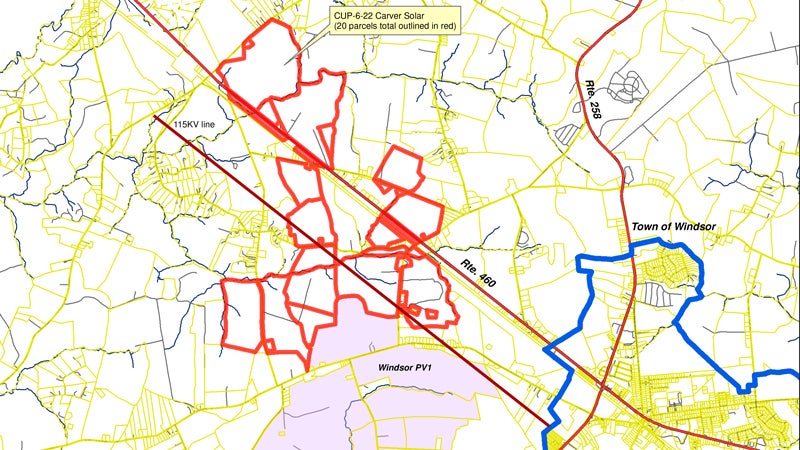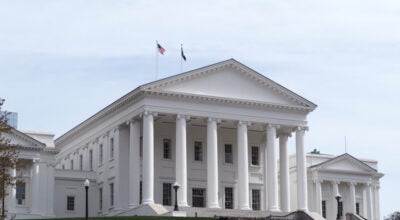Isle of Wight supervisors reject Zuni solar farm, form ‘energy task force’
Published 4:59 pm Friday, March 3, 2023

- This map, created by Isle of Wight County, shows the location of the proposed Carver Solar facility in red in relation to the borders of the town of Windsor in blue. (Image courtesy of Isle of Wight County)
Isle of Wight County supervisors have rejected plans for a Zuni area solar farm in a 3-2 vote.
The proposed 71-megawatt Carver Solar facility would have spanned 637 acres straddling both sides of Route 460 between the village of Zuni and the town of Windsor.
Supervisors Dick Grice and Rudolph Jefferson, who made a motion to approve the project, cast votes on Feb. 23 in favor of granting the conditional use permit Texas-based Open Road Renewables subsidiary Carver Solar I LLC had requested. Supervisors Joel Acree and Don Rosie voted against the project. When Chairman William McCarty cast the tiebreaking “no” vote, a crowd that had been sitting in the audience for three hours and 44 minutes waiting for a decision erupted into cheers and applause.
Twenty speakers had provided more than an hour of commentary on the matter at a Jan. 18 public hearing, most of them opposed to the project. Their concerns ranged from the potential visual impact on an otherwise rural area of the county to a woman who contended the electromagnetic fields produced by solar farms could potentially interfere with a medical implant in her spine. Company officials had contended following the hearing that there was “no firmly established link” between electromagnetic fields and health concerns, and asserted EMF levels emitted by utility-scale solar inverters reduce to below background levels at a distance of 150 feet. Open Roads had committed to a 200-foot minimum setback from Route 460, Cut Thru Road and any residential parcels.
Rosie, despite praising Open Roads’ proposal as the “most exhaustive, most complete” plan the county had received to date, stated he would be siding with his constituents in opposing the project, and pushed for his fellow supervisors to renew their commitment to establishing an “energy task force.”
In November, the county’s Planning Commission had recommended the supervisors form the task force to review the county’s existing energy infrastructure, remaining capacity in high-voltage transmission lines, future energy generation projects and emerging energy generation technologies.
“We haven’t done that, so being a person that values their word and character, I felt like to approve any more (solar farms) without doing what we said would not be honoring our word,” McCarty said, speaking to The Smithfield Times by phone as to why he’d voted against the Carver project.
Grice, though voting in favor of Carver’s proposal, noted the county’s Planning Commission was working on a draft ordinance that would limit the cumulative acreage of existing and proposed solar farms to 2% of Isle of Wight’s prime farmlands, a move he praised as a “legal means of preventing additional growth” of solar farms. Five days later, the Planning Commission voted 9-1 to advance the proposed 2% cap to the supervisors for a final vote, likely in April.
Following the 3-2 Carver vote, the supervisors voted unanimously to officially create the seven-member energy task force, which will be composed of one representative from each of the county’s five voting districts and two at-large members. Its purpose, according to Grice, will be to “look at, on a comprehensive basis, where we’re going to get our energies and our utilities in the future.”
While “the 2% (cap) is a piece of that kind of thinking,” Grice said, he asserted the task force would not limit its focus exclusively to solar.
“My stove is gas,” Grice said, “I don’t want to come back 10 years from now and be told I gotta tear that out and put in an electric range because they don’t have enough gas in this area.”
Gas stoves have become a hot political topic, particularly among Republicans, since January when a U.S. Consumer Product Safety Commission member told Bloomberg reporters that a ban on gas stoves was “on the table” amid concerns that the nitrogen dioxide and carbon monoxide emitted by the appliances pose a “hidden hazard.” Two days after the Bloomberg interview, the CPSC walked back the claim and contended there are no plans in the works to ban gas stoves.
“As you don’t go along with or don’t agree with certain aspects of, whether it’s a solar farm or whether it’s a wind farm, … when you’ve eliminated a lot of other options, what are you left with?” Acree said, noting the task force would be tasked with answering that question.
McCarty’s nomination of Planning Commission member Thomas Distefano to the task force passed unanimously. Distefano was the one who pushed for the development of the 2% cap in December. The other supervisors have yet to name their nominees, though Grice and Jefferson have each suggested engineer David Tucker of Rushmere, another frequent opponent of solar farms.
Since there was only a defeated motion to approve the Carver project, and no official vote to deny Open Roads’ a conditional use permit, the project technically remains pending. A similar situation occurred last year in Surry County, when supervisors voted down a motion to approve a solar farm across the street from the 17th century Bacon’s Castle homestead, but the project wasn’t officially killed until January.





